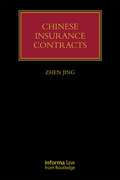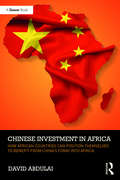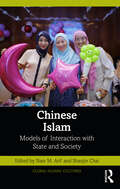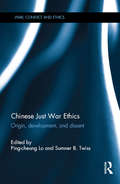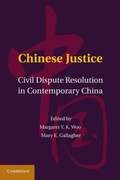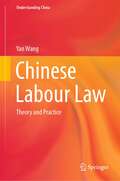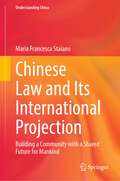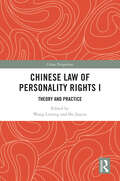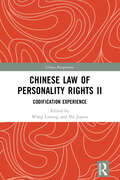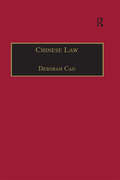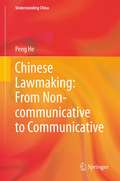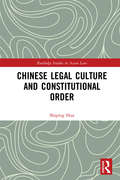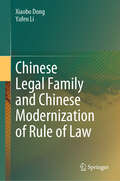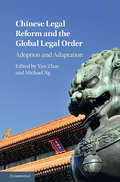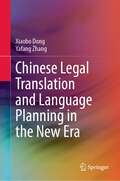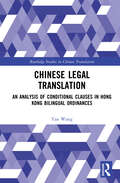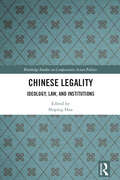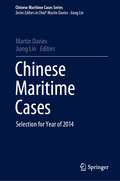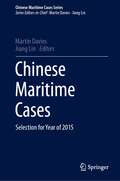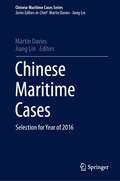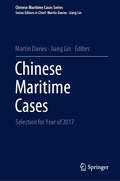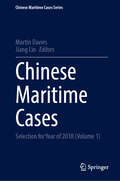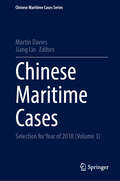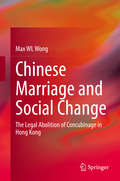- Table View
- List View
Chinese Insurance Contracts: Law and Practice (Lloyd's Insurance Law Library)
by Zhen JingChinese Insurance Contracts: Law and Practice is the first systematic text written in English on the law of insurance in China. This book offers a critical analysis of the major principles, doctrines and concepts of insurance contract law in China. At every point the analysis discusses the principles of the Insurance Law in detail, referring where appropriate to decided cases and also drawing attention to external influences. Readers are guided through the complexities of Chinese law in a clear and comprehensive fashion, and – significantly – in a manner that is accessible and meaningful for those used to a common law system. This book presents a comprehensive picture of Chinese insurance contract law, to facilitate a wider understanding of the relevant rules of law. Elements of insurance contract law are critically examined. In addition, this book presents rules of law on some special types of insurance contract, such as life insurance, property insurance, liability insurance, motor vehicle insurance, reinsurance, and marine insurance. The deficiencies and shortcomings of the law and practice will be identified and analysed; suggestions and recommendations on how to reform the law will be presented. Chinese Insurance Contracts also offers legal and practical advice to insurance professionals on how to draft clauses to avoid contractual pitfalls. It also uses cases to illustrate the difficulties which can arise in applying the principles in practice. This book will be essential reading for insurance companies and legal practitioners looking to do business in China, as well as reference for Chinese lawyers practising insurance law. It will also be a useful resource for students and academics studying Chinese law.
Chinese Investment in Africa: How African Countries Can Position Themselves to Benefit from China’s Foray into Africa
by David N. AbdulaiChina leads the world when it comes to investment and influence on the African continent. The extent of Chinese investment in Africa is well known and much has been written about China’s foray into Africa. However, most of the available material has approached this issue by looking at China as the ’New Colonialist’ – more interested in Africa’s vast natural resources than working in partnership for sustained development. Whilst China’s interest in Africa’s resources is evident, it is just half of the story. China’s foray into Africa goes beyond its appetite for natural resources and into the realm of geo-politics and international political economics. For example, China is all too aware of how it can cultivate Africa’s support on global issues at the United Nations and at other international fora. Breaking free from the binary arguments and analysis which characterize this topic, Professor Abdulai presents a refreshing perspective that China’s foray into Africa can produce win–win outcomes for China and Africa – if Africans really know what they want from China. Hitherto, each African country has tended to engage China with an individual bucket list; acting in isolation and not as part of a wider continent (indeed Africa and the African Union does not yet have a coordinated policy towards China). For Africa to be able to do that it needs to know where China is coming from, the factors that contributed to its awakening and success, and the benefits and possible pitfalls of this foray, in order to better position itself for a win–win engagement with China. This book will be a valuable read for policy makers, think-tanks and students of Africa-China studies programmes alike.
Chinese Islam: Models of Interaction with State and Society (Global Islamic Cultures)
by Nasr M. Arif Shaojin ChaiThis book explores the fascinating and complex histories of Islam and China. Meticulously researched and captivating, it provides a comprehensive history of the encounters and relationship between these two great civilizations, as well as the unique development and indigenization of Islam within China.The work looks at the early interactions between Arab Muslim traders and the Tang dynasty in the seventh century, shedding light on the establishment of the first Muslim communities in China. The narrative then progresses through subsequent dynasties, examining the ebbs and flows of Muslim influence, integration, and indigenization. It looks at the emergence of the Hui and other Muslim ethnic groups, who play a central role in the story of Chinese Islam. By delving into their customs, beliefs, and distinctive practices, the authors unveil the intricate process of indigenization, where Islam becomes deeply rooted in Chinese culture and society. One of the unique features of this collection is the nuanced analysis of the impact of major political events, as well as gradual social changes, on the process of adoption and transmission of Islam in China. The authors also highlight the role of economic activities, Chinese Islamic scholars, and key architectural landmarks in this multifaceted history.Part of the Global Islamic Cultures series that looks at integrated and indigenized Islam, this book will be of interest to students and researchers of religion, Islamic studies, religious history, political Islam, cultural studies, Islamic law, and Asian studies. It will also be useful to readers who are interested in world religions, theology, and cultures.
Chinese Just War Ethics: Origin, Development, and Dissent (War, Conflict and Ethics)
by Ping-Cheung Lo Sumner B TwissThis book offers the first comprehensive analysis of warfare ethics in early China as well as its subsequent development. Chinese attitudes toward war are rich and nuanced, ranging across amoral realism, defensive just war, humanitarian intervention, and mournful skepticism. Covering the five major intellectual traditions in the "golden age" of Chinese civilization: Confucian, Daoist, Mohist, Legalist, and Military Strategy schools, the book’s chapters immerse readers in the proper historical contexts, examine the moral concerns in the classical texts on their own terms, reframe those concerns in contemporary ethical idioms, and forge a critical dialogue between the past and the present. The volume develops fresh moral interpretations of classical texts such as The Art of War, Mencius, Xunzi, Mozi, and the Daodejing and discusses famous philosophers such as Han Fei and Wang Yang-ming, representing antithetical schools of thought about warfare. Attention is also given to the military ethics of the People’s Liberation Army, examining its thinking against the backdrop of its own civilizational context. This book will be of much interest to students of just war theory, Chinese politics, ethics, and philosophy, military studies, and International Relations in general.
Chinese Justice
by Mary E. Gallagher Margaret Y. WooThis volume analyzes whether China's thirty years of legal reform have taken root in Chinese society by examining how ordinary citizens are using the legal system in contemporary China. It is an interdisciplinary look at law in action and at legal institutions from the bottom up, that is, beginning with those at the ground level that are using and working in the legal system. It explores the emergent Chinese conception of justice - one that seeks to balance Chinese tradition, socialist legacies and the needs of the global market. Given the political dimension of dispute resolution in creating, settling and changing social norms, this volume contributes to a greater understanding of political and social change in China today and of the process of legal reform generally.
Chinese Labour Law: Theory and Practice (Understanding China)
by Yan WangThis book provides an overall understanding of Chinese labour law and covers many important issues related to the application of Chinese labour law. Particularly, the book explains the difficult points in Chinese labour law from the perspective of juridical practice. Many typical cases are selected to illustrate the important issues in Chinese labour law. These cases are from the courts in the developed areas in China, where foreign-funded enterprises gather. Also, the book addresses the implications of the Civil Code on the labour law. The latest developments are reflected in the book, which include guidelines related to labour dispute case hearing formulated by the Higher Courts in many provinces, and the guiding cases released by the Supreme Court. Such developments are the reflections of fragmented judicial application of Chinese labour law.
Chinese Law and Its International Projection: Building a Community with a Shared Future for Mankind (Understanding China)
by Maria Francesca StaianoThis book aims to explore the construction of Chinese law, with an evolution that has been strongly inspired by international law that has functioned as a "pioneer of legal civilization" in China. Chinese law is a fluid sedimentation of traditional elements of Chinese culture and the internalization of external elements.The internal dimension of Chinese legal evolution therefore coincides with a progressive incursion also at the international level, questioning the traditional rules of international relations. The most relevant and comprehensive concept that has been proposed by China in recent years is certainly the idea of building a "community of shared future for mankind." This aspiration demonstrates a global and integral vocation of international law capable of embracing relations of a new type, towards a multi-polar democratization of international relations, which mark the need for the beginning of a new era.
Chinese Law of Personality Rights I: Theory and Practice (China Perspectives)
by Wang Liming and Shi JiayouThis volume is a collection of up-to-date, authoritative essays on China’s Law of Personality Rights, its impact in practice and its legal background. The Law of Personality Rights was enacted in China in May 2020, the first time that the Law has been legislated as an independent part of the Civil Code of the People's Republic of China, marking an unprecedented step in protecting the personality rights of citizens. As the first volume of a two-volume set that elucidates the theory, practice, and codification experience of the Law in China, the book examines the basis for the Law as a standalone part of the Civil Code, its overall framework and the delimitation and formation of the Law. In terms of practical aspects, the contributors delve into institutional arrangements, the relationship between human rights and personality rights and the relationship with laws on tort liability, as well as those pertaining to marriage and the family. The book will be an essential reference to scholars and students studying civil law, continental law, Chinese law, and the legal protection of personality rights.
Chinese Law of Personality Rights II: Codification Experience (China Perspectives)
by Wang Liming Shi JiayouThis volume is a collection of articles on the codification experience of China’s Law of Personality Rights, explaining the design of the Law as well as its innovations.As the second volume of a two-volume set that elucidates the theory, practice, and codification of the Law in China, the book explains the legal advancement of the Law of Personality Rights as a standalone part of the Civil Code of China. This includes innovative legislative thinking, law system arrangements, rule designs, and a systematic refinement of the provisions of personality rights in terms of nature, system, types, content, exercising rules and protection methods. Regarding the implementation of the Law, the book points out that personality rights are changing with the times so a more complete system of legal interpretation should be built. The final three chapters are appraisals of different versions of the draft law, with amendments to some articles advanced based on shortcomings and omissions.The book will be an essential reference to scholars and students studying civil law, continental law, Chinese law, and the legal protection of personality rights.
Chinese Law: A Language Perspective
by Deborah CaoStudying Chinese law from a linguistic and communicative perspective, this book examines meaning and language in Chinese law. It investigates key notions and concepts of law, the rule of law, and rights and their evolutionary meanings. It examines the linguistic usage and textual features in Chinese legal texts and legal translation, and probes the lawmaking process and the Constitution as speech act and communicative action. Taking a cross-cultural approach, the book applies major Western philosophical thought to Chinese law, in particular the ideas concerning language and communication by such major thinkers as Peirce, Whorf, Gadamer, Habermas, Austin and Searle. The focus of the study is contemporary People's Republic of China; however, the study also traces and links the inherited and introduced cultural and linguistic values and configurations that provide the context in which modern Chinese law operates.
Chinese Lawmaking: From Non-communicative To Communicative (Understanding China)
by Peng HeDr Peng He in her book addresses various issues, drawing on Western and Chinese sources for her argument for a 'communicative' theory of law making. This book is both timely and important in the Chinese context. Her argument depends upon the insight that what is important in societies is not just representative democracy but 'voice' - the opportunity for individuals to be heard and bring their input into official systems. More than that, she argues that this can also take further the idea of living by the rules as something that is not to be seen as narrow Legalism but as something more akin to living 'righteously' - a view which is resonant with parts of Chinese legal thought. This book is also important in the present Chinese context in another way. The developing economy necessitates substantial legal reform. But applying Western models to China can often be naïve and not fully fulfil their intended purpose. Peng He's work addresses this by looking at the process of legislation in connection with legal reform. It is grounded in a sound theoretical reflection of both the process of legal transplantation and the process of law making, and looks both at Western and Chinese sources. Such an approach needs to draw from several intellectual traditions and it is this interdisciplinary, foundational research that is the task Dr He has set herself in her project. Her theory will provide an abstract theoretical framework that is sensitive to local conditions, while at the same time incorporating insights on law reform from a broad range of disciplines. Her research is of direct practical relevance for reforming the legislative process in China. ----Professor Zenon BaÅ,,kowski The University of Edinburgh
Chinese Legal Culture and Constitutional Order (Routledge Studies in Asian Law)
by Shiping HuaThis book examines China’s striving for a constitutional order in the 20th century from comparative, historical, and theoretical perspectives. Through a comprehensive study of six major constitutional reforms experienced by China in the last century, Shiping Hua explores pragmatism, instrumentalism, statism, and favoritism as the key features of the Chinese legal culture. Demonstrating that these characteristics have roots in China’s ancient past and coincide with modern communist legal theory, it argues that Chinese legal culture has greatly impacted upon the country’s move to modernize its legal system. By analyzing key constitutional periods in China’s history, this book also evaluates patterns that can be used to better comprehend not only China’s present legal reform but its future legal developments too. As the first book to examine how the Chinese legal culture has affected constitutional reform in the 20th century, Chinese Legal Culture and Constitutional Order will be useful to students and scholars of Asian and constitutional law, as well as Chinese Studies more generally.
Chinese Legal Family and Chinese Modernization of Rule of Law
by Xiaobo Dong Yafen LiThis book lays a more solid cognitive foundation for interaction between the international community and China. From a historical and cultural perspective, this groundbreaking book provides an in-depth exploration of the integration of traditional Chinese legal thought with modern concepts of the rule of law. Written by a leading interdisciplinary research team of legal and legal history experts in China, this book not only offers profound insights for legal professionals, but also opens a window for ordinary readers to understand the development path and historical-cultural roots of China's rule of law. As China's global influence grows, its profound legal culture, imbued with unique governance experience and wisdom, is also shaping the world.
Chinese Legal Reform and the Global Legal Order: Adoption and Adaptation
by Yun Zhao Michael NgThis volume critically evaluates the latest legal reform of China, covering major areas such as trade and securities law, online privacy law, criminal law, human rights and international law. It represents a bold departure from the most recent works on Chinese legal reform by engaging the ideas of experts in contemporary Chinese law with the archival scholarship of Chinese legal historians. This unique interdisciplinary feature affords readers a more nuanced view of the complexities and specificities of how China has problematised legal reforms in various historical contexts when building a progressive yet sustainable legal system. This volume appraises the most current reform in Chinese law by considering China's engagement with globalisation, increasingly complicated domestic situation and historical legal transplantation experiences. It will be of huge interest to students, researchers and practitioners interested in Chinese law and policy, China and Asian studies and Chinese legal history.
Chinese Legal Translation and Language Planning in the New Era
by Xiaobo Dong Yafang ZhangBy making a comprehensive and interdisciplinary analysis on the translation history of both the ancient Chinese legal classics and the modern laws and regulations, this book presents a full picture of development of Chinese legal translation. Legal translation in China has undergone twists and turns in the past and always lacked a systematic and comprehensive theoretical framework. Therefore, guided by the language planning theory, this book intends to build a theoretical framework for study and practices of legal translation in the New Era and provide a feasible path for general readers, students of relevant majors, and professionals interested in Chinese legal culture to get a refreshed understanding legal translation and legal culture promotion.
Chinese Legal Translation: An Analysis of Conditional Clauses in Hong Kong Bilingual Ordinances (Routledge Studies in Chinese Translation)
by Wang YanChinese Legal Translation analyses and investigates the Chinese translation of conditional clauses introduced by various introductory words in Hong Kong bilingual ordinances within the framework of descriptive translation studies and translation typology. This book explores the text typology of Hong Kong bilingual ordinances and highlights differences and similarities between different translations of conditional clauses in the Hong Kong context. Based on both quantitative and qualitative analysis of conditional clauses of the Companies Ordinance, the book summarises the frequency of introductory words of conditional clauses and generalises guiding patterns for writing conditional clauses and translating conditional clauses. The book is significant in providing both theoretical foundations for legal translation and practical guidance for translating legal conditional clauses. This book is primarily targeted for scholars and professionals who are interested in legal writing and legal translation, as well as for students and practitioners in legal translation.
Chinese Legality: Ideology, Law, and Institutions (Routledge Studies on Comparative Asian Politics)
by Shiping HuaChinese Legality focuses on the concept of "legality" as a lens through which to look at Chinese legal reforms, making a valuable contribution to the argument that law has historically been used as a tool to control society in China. This book discusses how Chinese legality in the Xi Jinping era is defined from a theoretical, ideological, historical, and cultural point of view. Covering vitally important events such as Xi’s term limit issue, the Hong Kong protests and the Covid-19 pandemic, the book examines how legality is reflected and embodied in laws and constitutions, and how legality is realized through institutions, with particular focus on how the CCP interacts with the legislature, the judiciary, the procuratorate, and the police. As a study of the legal reforms under Xi Jinping, this book will be of interest to students and scholars of Chinese politics and law.
Chinese Maritime Cases: Selection for Year of 2014 (Chinese Maritime Cases Series)
by Martin Davies Jiang LinThis book selects leading, innovative and influential Chinese maritime judgments and presents full translation of them, with brief summary, to the readers so that they can have insights of how the Chinese maritime judges interpret, apply and develop Chinese maritime law in practice. China trades with other states in trillions of USD every year, and about 95% of the cargoes are carried by ocean-going ships calling at hundreds of Chinese ports each single day. Due to the enormous and steadily growing trade volume and shipping activities, foreign ships, companies and persons are often caught by the Chinese maritime law and court. The parties involved and their lawyers are more than ever enthusiastic to study Chinese maritime cases in order to deal with their own cases properly or, if possible, predict the potential problems and avoid the disputes outright. The book is appealing to and benefits worldwide law students, academics, practitioners and industrial people in the shipping, trade, insurance and financial fields. The book remedies to certain extent the situation that there is lack of authoritative sources available to foreign personnel to look into how Chinese justice system functions.
Chinese Maritime Cases: Selection for Year of 2015 (Chinese Maritime Cases Series)
by Martin Davies Jiang LinThis book selects leading, innovative and influential Chinese maritime judgments and presents full translation of them, with brief summary, to the readers so that they can have insights of how the Chinese maritime judges interpret, apply and develop Chinese maritime law in practice. China trades with other states in trillions of USD every year, and about 95% of the cargoes are carried by ocean-going ships calling at hundreds of Chinese ports each single day. Due to the enormous and steadily growing trade volume and shipping activities, foreign ships, companies and persons are often caught by the Chinese maritime law and court. The parties involved and their lawyers are more than ever enthusiastic to study Chinese maritime cases in order to deal with their own cases properly or, if possible, predict the potential problems and avoid the disputes outright. The book is appealing to and benefits worldwide law students, academics, practitioners and industrial people in the shipping, trade, insurance and financial fields. The book remedies to certain extent the situation that there is lack of authoritative sources available to foreign personnel to look into how Chinese justice system functions.
Chinese Maritime Cases: Selection for Year of 2016 (Chinese Maritime Cases Series)
by Martin Davies Jiang LinThis book selects leading, innovative and influential Chinese maritime judgments and presents full translation of them, with brief summary, to the readers so that they can have insights of how the Chinese maritime judges interpret, apply and develop Chinese maritime law in practice. China trades with other states in trillions of USD every year, and about 95% of the cargoes are carried by ocean-going ships calling at hundreds of Chinese ports each single day. Due to the enormous and steadily growing trade volume and shipping activities, foreign ships, companies and persons are often caught by the Chinese maritime law and court. The parties involved and their lawyers are more than ever enthusiastic to study Chinese maritime cases in order to deal with their own cases properly or, if possible, predict the potential problems and avoid the disputes outright. The book is appealing to and benefits worldwide law students, academics, practitioners and industrial people in the shipping, trade, insurance and financial fields. The book remedies to certain extent the situation that there is lack of authoritative sources available to foreign personnel to look into how Chinese justice system functions.
Chinese Maritime Cases: Selection for Year of 2017 (Chinese Maritime Cases Series)
by Martin Davies Jiang LinThis book selects leading, innovative and influential Chinese maritime judgments and presents full translation of them, with brief summary, to the readers so that they can have insights of how the Chinese maritime judges interpret, apply and develop Chinese maritime law in practice. China trades with other states in trillions of USD every year, and about 95% of the cargoes are carried by ocean-going ships calling at hundreds of Chinese ports each single day. Due to the enormous and steadily growing trade volume and shipping activities, foreign ships, companies and persons are often caught by the Chinese maritime law and court. The parties involved and their lawyers are more than ever enthusiastic to study Chinese maritime cases in order to deal with their own cases properly or, if possible, predicate the potential problems and avoid the disputes outright. The book is appealing to and benefits worldwide law students, academics, practitioners and industrial people in the shipping, trade, insurance and financial fields. The book remedies to certain extent the situation that there is lack of authoritative sources available to foreign personnel to look into how Chinese justice system functions.
Chinese Maritime Cases: Selection for Year of 2018 (Volume 1) (Chinese Maritime Cases Series)
by Martin Davies Jiang LinChina (the Mainland of PRC) trades with other states in trillions of USD every year, and about 95% of the cargoes are carried by ocean-going ships calling at hundreds of Chinese ports each singe day. Due to the enormous trade volume and shipping activities, foreign ships, companies and professionals are often caught in the Chinese maritime law and court. The foreign parties involved in Chinese litigation or dispute resolution and their lawyers are more and more enthusiastic to study Chinese maritime cases in order to deal with their own cases properly or, if possible, predicate the potential risks and avoid the disputes outright. However, to date, no Chinese series casebook has ever been published. Now, for the first time, the authors offer this series casebook of delicately selected Chinese maritime judgments. Each year, the book selects a number of leading, innovative and influential Chinese maritime judgments and presents full English translation of them, together with summary, to the readers so that they can have insights of how the Chinese maritime judges interpret, apply and develop Chinese maritime law in practice. The book will benefit the worldwide students, academics, practitioners and industrial people who may be engaged in international trade, shipping, insurance and other transactions concerning China. The book will also indemnify to certain extent the situation that there is lack of authoritative sources available to foreign personnel to look into how Chinese justice system functions and grows in real life.
Chinese Maritime Cases: Selection for Year of 2018 (Volume 2) (Chinese Maritime Cases Series)
by Martin Davies Jiang LinChina (the Mainland of PRC) trades with other states in trillions of USD every year, and about 95% of the cargoes are carried by ocean-going ships calling at hundreds of Chinese ports each singe day. Due to the enormous trade volume and shipping activities, foreign ships, companies and professionals are often caught in the Chinese maritime law and court. The foreign parties involved in Chinese litigation or dispute resolution and their lawyers are more and more enthusiastic to study Chinese maritime cases in order to deal with their own cases properly or, if possible, predicate the potential risks and avoid the disputes outright. However, to date, no Chinese series casebook has ever been published. Now, for the first time, the authors offer this series casebook of delicately selected Chinese maritime judgments. Each year, the book selects a number of leading, innovative and influential Chinese maritime judgments and presents full English translation of them, together with summary, to the readers so that they can have insights of how the Chinese maritime judges interpret, apply and develop Chinese maritime law in practice. The book will benefit the worldwide students, academics, practitioners and industrial people who may be engaged in international trade, shipping, insurance and other transactions concerning China. The book will also indemnify to certain extent the situation that there is lack of authoritative sources available to foreign personnel to look into how Chinese justice system functions and grows in real life.
Chinese Maritime Cases: Selection for Year of 2018 (Volume 3) (Chinese Maritime Cases Series)
by Martin Davies Jiang LinChina (the Mainland of PRC) trades with other states in trillions of USD every year, and about 95% of the cargoes are carried by ocean-going ships calling at hundreds of Chinese ports each singe day. Due to the enormous trade volume and shipping activities, foreign ships, companies and professionals are often caught in the Chinese maritime law and court. The foreign parties involved in Chinese litigation or dispute resolution and their lawyers are more and more enthusiastic to study Chinese maritime cases in order to deal with their own cases properly or, if possible, predicate the potential risks and avoid the disputes outright. However, to date, no Chinese series casebook has ever been published. Now, for the first time, the authors offer this series casebook of delicately selected Chinese maritime judgments. Each year, the book selects a number of leading, innovative and influential Chinese maritime judgments and presents full English translation of them, together with summary, to the readers so that they can have insights of how the Chinese maritime judges interpret, apply and develop Chinese maritime law in practice. The book will benefit the worldwide students, academics, practitioners and industrial people who may be engaged in international trade, shipping, insurance and other transactions concerning China. The book will also indemnify to certain extent the situation that there is lack of authoritative sources available to foreign personnel to look into how Chinese justice system functions and grows in real life.
Chinese Marriage and Social Change: The Legal Abolition of Concubinage in Hong Kong
by Max WL WongThis book provides a comparative account of the abolition of concubinage in East Asia, offering a new perspective and revised analysis of the factors leading to – and the debates surrounding – the introduction of a new Marriage Reform Ordinance in Hong Kong in 1971. It uses this law as a platform to examine how the existence of concubinage – long preserved in the name of protecting Chinese traditions and customs — crucially influenced family law reforms, which were in response to a perceived need to create a ‘modern’ marriage system within Hong Kong’s Chinese community after the Second World War. This was, by and large, the result of continued pressure from within Hong Kong and from Britain to bring Hong Kong’s marriage system in line with international marriage treaties. It represented one of the last significant intrusions of colonial law into the private sphere of Hong Kong social life, eliminating Chinese customs which had been previously recognised by the colonial legal system’s family law. This book contextualizes the Hong Kong situation by examining judicial cases interpreting Chinese customs and the Great Qing Code, offering a comprehensive understanding of the Hong Kong situation in relation to the status of concubines in Republican China and other East Asian jurisdictions. It will be of particular interest to teachers and students of law, as well as researchers in gender studies, post-colonialism, sociology and cultural studies.
